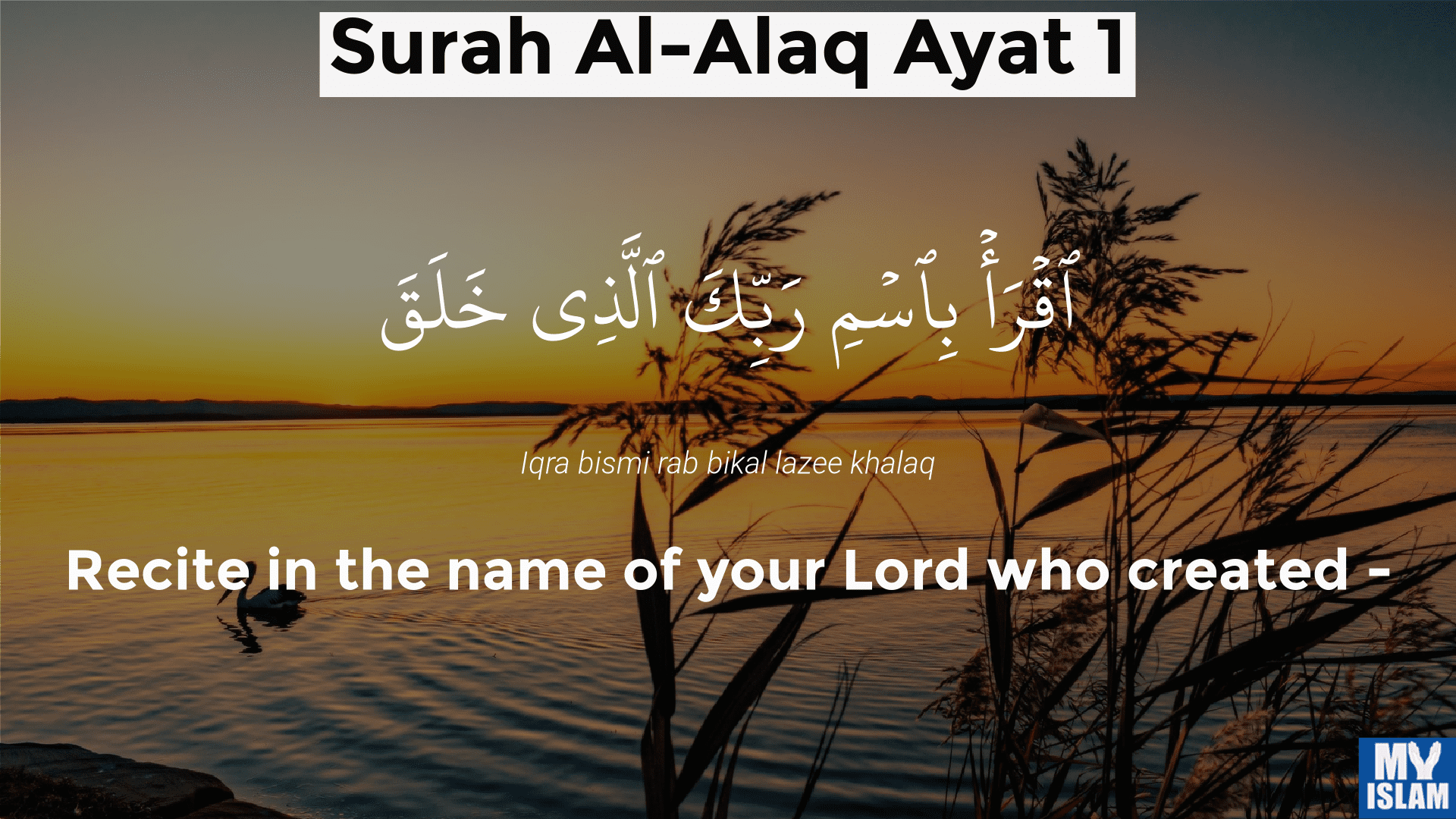Surah Alaq Ayat 1 in Arabic Text
English Translation
Here you can read various translations of verse 1
Recite in the name of your Lord who created –
Proclaim! (or read!) in the name of thy Lord and Cherisher, Who created-
Recite in the name of your Lord Who created,
Read! In the Name of your Lord, Who has created (all that exists),
Read: In the name of thy Lord Who createth,
Read: In the Name of your Lord Who created,
Read! In the name of your Lord who created:
پڑھ اپنے رب کے نام سے جس نے پیدا کیا
Quran 96 Verse 1 Explanation
For those looking for commentary to help with the understanding of Surah Alaq ayat 1, we’ve provided two Tafseer works below. The first is the tafseer of Abul Ala Maududi, the second is of Ibn Kathir.
Ala-Maududi
(96:1) Recite[1] in the name of your Lord[2] Who created,[3]
1. As we have explained in the Introduction, when the Angel said to the Prophet (peace be upon him): Read, the latter replied: I cannot read! This indicates that the Angel had presented these words of the revelation before him in the written form and had asked him to read them. For if the Angel had meant that he should repeat what he recited, he should not have replied, saying: I cannot read!
2. Read in the name of your Lord: Say Bismillah and read. This shows that the Prophet (peace be upon him) even before the coming down of this revelation regarded and acknowledged Allah alone as his Lord. That is why there was no need to ask who his Lord was, but it was said: Read in the name of your Lord.
3. Only the word khalaqa (created) has been used absolutely, and the object of creation has not been mentioned. This automatically gives the meaning: Read in the name of the Lord, Who is the Creator, Who created the whole universe and everything in it.
Ibn-Kathir
1. Read! In the Name of your Lord Who created. 2. He has created man from a clot. 3. Read! And your Lord is the Most Generous. 4. Who has taught by the pen. 5. He has taught man that which he knew not.
Imam Ahmad recorded that `A’ishah said: The first thing that began happening with the Messenger of Allah from the revelation was dreams that he would see in his sleep that would come true. He would not see any dream except that it would come true just like the (clearness of) the daybreak in the morning. Then seclusion became beloved to him. So, he used to go to the cave of Hira’ and devote himself to worship there for a number of nights, and he would bring provisions for that. Then he would return to Khadijah and replenish his provisions for a similar number of nights. This continued until the revelation suddenly came to him while he was in the cave of Hira’. The angel came to him while he was in the cave and said, “Read!” The Messen- ger of Allah said,
(I replied: “I am not one who reads.) Then he said, “So he (the angel) seized me and pressed me until I could no longer bear it. Then he released me and said: `Read!’ So I replied: `I am not one who reads.’ So, he pressed me a second time until I could no longer bear it. Then he released me and said:
(Read in the Name of your Lord who has created.) until he reached the Ayah,
(That which he knew not. )” So he returned with them (those Ayat) and with his heart trembling until he came (home) to Khadijah, and he said,
(Wrap me up, wrap me up!) So they wrapped him up until his fear went away. After that he told Khadijah everything that had happened (and said),
(I fear that something may happen to me.) Khadijah replied, “Never! By Allah, Allah will never disgrace you. You keep good relations with your relatives, you speak the truth, you help the poor and the destitute, you serve your guests generously, and you help the deserving, calamity afflicted people.” Khadijah then accompanied him to her cousin Waraqah bin Nawfal bin Asad bin `Abdul-`Uzza bin Qusay, who, during the period of ignorance became a Christian and used to scribe the Scriptures in Arabic. He would write from the Injil in Hebrew as much as Allah willed for him to write. He was an old man and had lost his eyesight. Khadijah said to him, “O my cousin! Listen to the story of your nephew.” Waraqah asked, “O my nephew! What have you seen” Allah’s Messenger described what he saw. Waraqah said, “This is An-Namus whom Allah had sent to Musa. I wish I was young and could live until the time when your people would drive you out.” Allah’s Messenger asked,
(Will they drive me out) Waraqah replied in the affirmative and said, “Anyone who came with something similar to what you have brought, was treated with hostility and enmity; and if I should remain alive till that day then I would firmly support you.” But Waraqah did not remain. He died and the revelation paused until Allah’s Messenger became sad according to what we were told. Due to this grief he set out a number of times with the intent of throwing himself from the mountain tops. However, every time he would reach the peak of a mountain to throw himself from it, Jibril would appear to him and say, “O Muhammad! You are truly the Messenger of Allah!” Therefore, his worry would be eased, his soul would be settled and he would return (down from the mountain). Then, when the revelation did not come again for a long time, he set out as he had done before. So when he reached the peak of the mountain, Jibril appeared to him again and said to him the same as he had said before.” This Hadith has been recorded in the Two Sahihs by way of Az-Zuhri. We have already discussed this Hadith’s chain of narration, its text and its meanings at length in the beginning of our explanation of Sahih Al-Bukhari. Therefore, whoever would like to read it, it is researched there, and all praise and blessings are due to Allah. So the first thing that was revealed of the Qur’an were these noble and blessed Ayat. They are the first mercy that Allah bestowed upon His servants and the first bounty that Allah favored them with.
These Ayat inform of the beginning of man’s creation from a dangling clot, and that out of Allah’s generosity He taught man that which he did not know. Thus, Allah exalted him and honored him by giving him knowledge, and it is the dignity that the Father of Humanity, Adam, was distinguished with over the angels. Knowledge sometimes is in the mind, sometimes on the tongue, and sometimes in writing with the fingers. Thus, it may be intellectual, spoken and written. And while the last (written) necessitates the first two (intellectual and spoken), the reverse is not true. For this reason Allah says,
(Read! And your Lord is the Most Generous. Who has taught by the pen. He has taught man that which he knew not.) There is a narration that states, “Record knowledge by writing.” There is also a saying which states, “Whoever acts according to what he knows, Allah will make him inherit knowledge that he did not know.”
Quick navigation links






